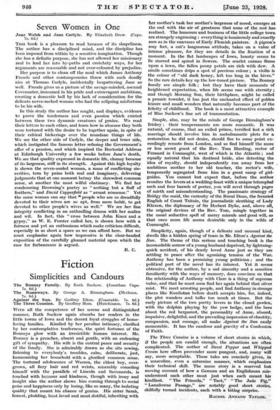Seven Women in One
Jane Welsh and Jane Carlyle. By Elizabeth Drew. (Cape. 7s. 6d.)
Tins book is a pleasure to read because of its shapeliness. The author has a disciplined mind, and the discipline has been imposed from within by a sensitive imagination. Though she has a definite purpose, she has not allowed her missionary zeal to lead her into by-paths and crotchety ways, for her arguments are reasonable and not over-coloured by prejudice.
Her purpose is to clean off the mud which James Anthony Froude and other contemporaries threw with such deadly aim at Thomas Carlyle, incidentally bespattering Jane as well. Froude gives us a picture of the savage-minded, asexual Covenanter, immersed in his pride and extravagant ambitions, creating a domestic hell by his lack of consideration for the delicate nerve-racked woman who had the eclipsing misfortune to be his wife.
In this study the author has sought, and displays, evidence to prove the tenderness and even passion which existed between these two dynamic creatures of genius. We read their letters to each other, and learn how in absence they both were tortured with the desire to be together again, in spite of their critical bickerings over the mundane things of life. We see the other side of Carlyle, the deeper and truer side, which instigated the famous letter refusing the Government's offer of a pension, and which inspired the Rectorial Address at Edinburgh University a few weeks before Jane's death. We see that quality expressed in domestic life, clumsy because of its largeness, stiff in its strength. Against this high loyalty is shown the seven-souled woman, a mass of conflicting sin- cerities, torn by pains both real and imaginary, delivering judgments that at one moment betray the shrewdest common sense, at another the most wilful obstinacy. We find her condemning Browning's poetry as " nothing but a fluff of feithers," and David Copperfieki as " arrant nonsense." Yet the same woman can say that people who are so dreadfully devoted to their wives are so apt, from mere habit, to get devoted to other people's wives as well." We see her fine integrity conflicting in an enthralling drama with her malice and wit. In fact, this " cross between John Knox and a gypsy," as W. E. Forster called her, is shown here with a fairness and yet an enthuginsm which make criticism difficult, especially in so short a space as we can afford here. But we must emphasize again how impressive is the clear-headed exposition of the carefully gleaned material upon which the case for forbearance is argued.
R. C.






























 Previous page
Previous page